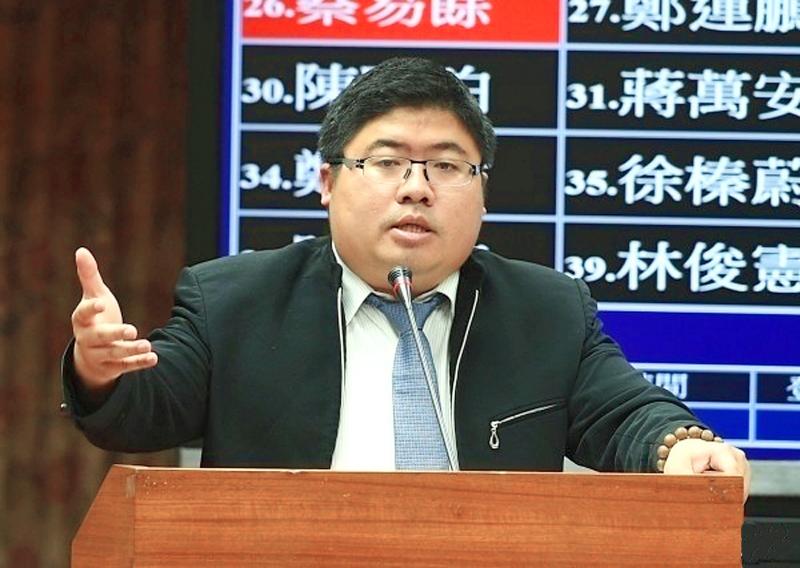Democratic Progressive Party (DPP) Legislator Tsai Yi-yu (蔡易餘) yesterday retracted a proposal to remove “unification of the nation” from the Act Governing Relations Between the People of the Taiwan Area and the Mainland Area (台灣地區與大陸地區人民關係條例), citing concern over the proposal throwing cross-strait ties off balance ahead of President Tsai Ing-wen’s (蔡英文) re-inauguration on Wednesday next week.
He also withdrew a similar proposal to amend the preface to the Additional Articles of the Constitution by taking out “to meet the needs before the unification of the nation.”
The proposed amendment to the act had advanced to committee review, while the proposals to amend the additional articles of the Constitution could have passed a first reading yesterday, Tsai Yi-yu said.

Photo: Huang Hsin-po, Taipei Times
Given that the world has likely seen through the nature of the Chinese Communist Party amid the COVID-19 pandemic, he thought it was the right time to help the nation break free from the framework of unification imposed by the additional articles of the Constitution, promulgated in 1991, he said.
However, with Tsai Ing-wen’s inauguration approaching, he did not want the proposals to be a source of contention for China and opposition parties, which would give Beijing a pretext for saber rattling and undermining peace, he said.
Following discussions with DPP caucus whip Ker Chien-ming (柯建銘), Tsai Yi-yu, despite acknowledging a recent swell of anti-China sentiment, said he decided not to run the risk.
He is aware that retracting the proposals would invite ridicule, but he had to do so for the nation’s future, he said, adding that he believes that the president would lead the nation along the right path.
Tamkang University Graduate Institute of China Studies associate professor Chang Wu-ueh (張五岳) said that Tsai Yi-yu likely had to retract the proposals because Tsai Ing-wen said in her inauguration speech four years ago that she would abide by the act, the Constitution and other applicable laws when handling cross-strait relations, which are fragile due to a lack of mutual trust between Taipei and Beijing.
Although the act is on a lower level than the Constitution, it defines the fundamentals of cross-strait relations, so Tsai Yi-yu’s proposal to change the act — which would change those fundamentals — would likely trigger China, Chang said.
The retraction of the bills is a gesture of basic goodwill, which shows the nation’s stance on cross-strait ties has remained consistent and that it would not resort to “double-dealing” over the issue, he said.
Separately yesterday, Chinese Nationalist Party (KMT) Chairman Johnny Chiang (江啟臣) called on the DPP to stop exploiting cross-strait issues.
The DPP had submitted a slew of similar proposals in the past, which all petered out as DPP lawmakers were not serious about pushing them forward, Chiang said.
The DPP should give a clear explanation about why it has retracted the proposals, he said.
Additional reporting by Shih Hsiao-kuang

Taiwan has received more than US$70 million in royalties as of the end of last year from developing the F-16V jet as countries worldwide purchase or upgrade to this popular model, government and military officials said on Saturday. Taiwan funded the development of the F-16V jet and ended up the sole investor as other countries withdrew from the program. Now the F-16V is increasingly popular and countries must pay Taiwan a percentage in royalties when they purchase new F-16V aircraft or upgrade older F-16 models. The next five years are expected to be the peak for these royalties, with Taiwan potentially earning

STAY IN YOUR LANE: As the US and Israel attack Iran, the ministry has warned China not to overstep by including Taiwanese citizens in its evacuation orders The Ministry of Foreign Affairs (MOFA) yesterday rebuked a statement by China’s embassy in Israel that it would evacuate Taiwanese holders of Chinese travel documents from Israel amid the latter’s escalating conflict with Iran. Tensions have risen across the Middle East in the wake of US and Israeli airstrikes on Iran beginning Saturday. China subsequently issued an evacuation notice for its citizens. In a news release, the Chinese embassy in Israel said holders of “Taiwan compatriot permits (台胞證)” issued to Taiwanese nationals by Chinese authorities for travel to China — could register for evacuation to Egypt. In Taipei, the ministry yesterday said Taiwan

‘LIKE-MINDED PARTNER’: Tako van Popta said it would be inappropriate to delay signing the deal with Taiwan because of China, adding he would promote the issue Canadian senators have stressed Taiwan’s importance for international trade and expressed enthusiasm for ensuring the Taiwan-Canada trade cooperation framework agreement is implemented this year. Representative to Canada Harry Tseng (曾厚仁) in an interview with the Central News Agency (CNA) said he was increasingly uneasy about Ottawa’s delays in signing the agreement, especially as Ottawa has warmed toward Beijing. There are “no negotiations left. Not only [is it] initialed, we have three versions of the text ready: English, French and Mandarin,” Tseng said. “That tells you how close we are to the final signature.” Tseng said that he hoped Canadian Prime Minister Mark Carney

POSITIVE DEVELOPMENT: Japan and the US are expected to hold in-depth discussions on Taiwan-related issues during the meeting next month, Japanese sources said The holding of a Japan-US leaders’ meeting ahead of US President Donald Trump’s visit to China is positive news for Taiwan, former Japan-Taiwan Exchange Association representative Hiroyasu Izumi said yesterday. After the Liberal Democratic Party’s landslide victory in Japan’s House of Representatives election, Japanese Prime Minister Sanae Takaichi is scheduled to visit the US next month, where she is to meet with Trump ahead of the US president’s planned visit to China from March 31 to April 2 for a meeting with Chinese President Xi Jinping (習近平). Japan and the US are expected to hold in-depth discussions on Taiwan-related issues during the